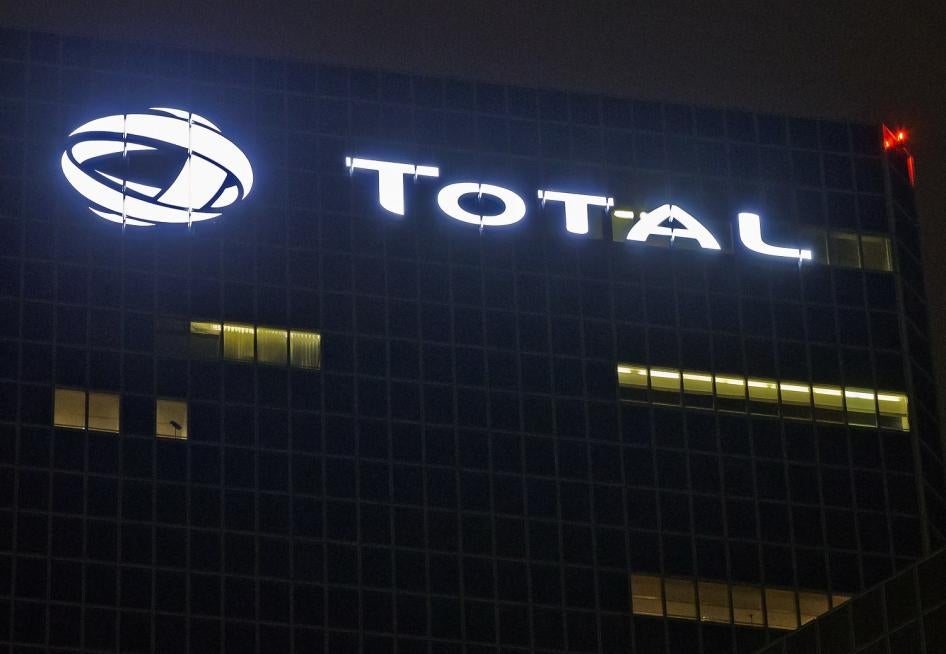(New York) – Governments and energy companies should follow up a recent decision by Chevron and Total SA to suspend payments from a gas pipeline project in Myanmar with additional steps to cut off funding to the country’s military junta, Human Rights Watch said today. While the May 26, 2021 announcement reflects a shift in corporate dealings with the junta that seized power on February 1 and has engaged in a brutal crackdown since, the payments are just a modest amount of the military’s overall gas revenues.
Governments and all energy companies operating in Myanmar should take stronger action to block natural gas revenues flowing to the Myanmar military. Natural gas revenue is the military’s largest source of foreign currency income, including approximately $1 billion in duties, taxes, royalties, fees, tariffs, and other profits. The dividends suspended by Chevron and Total are a minimal part of the overall payments the government receives from natural gas.
“Chevron and Total’s recent decision is a step in the right direction, but it affects less than 5 percent of the natural gas revenue the Myanmar junta receives,” said John Sifton, Asia advocacy director. “To have real impact, governments and companies need to go further to stop the junta from receiving funds or accessing bank accounts that receive payments.”
The decision announced by Total and Chevron concerns only a 15 percent dividend paid by a pipeline company, the Moattama Gas Transportation Company (“Moattama”), from profits from transportation fees it earns moving gas from Myanmar’s offshore Yadana gas field to Myanmar and Thailand. Total said the payments were suspended as of April 1.
Total and Chevron together are the majority owners in Moattama, with 31.2 percent and 28.3 percent of the project, respectively. The military-controlled company Myanmar Oil and Gas Enterprise (MOGE), owns 15 percent, and the Thailand state-owned gas company PTT owns 25.5 percent. Total acts as the “operator” of the Yadana wellheads and Moattama’s pipeline infrastructure. The suspended payments are dividends to these companies based on their ownership share. According to Moattama financial records, the company paid MOGE about $38 million in 2018 and approximately $52 million in 2019, consistent with EITI reporting indicating that MOGE’s overall gas transportation dividends from gas operations are less than 7 percent of overall state revenue from natural gas.
Total’s and Chevron’s statements do not mention the hundreds of millions of dollars in additional tariffs, fees, and tax payments that Moattama pays to Myanmar military-controlled bank accounts. The statement does not apply to hundreds of millions of dollars more that MOGE receives from its share of revenues from selling gas to PTT.
“While only a modest amount of the overall revenues was suspended, Total and Chevron’s decision signifies that at least some companies in Myanmar recognize that their cash payments to junta-controlled accounts create major reputational risks,” Sifton said.
Total acknowledged the dire situation in Myanmar and suggested in its statement that further action might be taken: “Total condemns the violence and human rights abuses occurring in Myanmar and reaffirms that it will comply with any decision that may be taken by international and national authorities, including applicable sanctions issued by the EU or US authorities.”
Chevron’s statement noted that the company “condemns the violence and human rights abuses occurring in Myanmar. We stand with the people of Myanmar and the global community in urging for a peaceful resolution that respects the will of the people.” The company said that it would respect sanctions imposed on additional gas revenue but cautioned against them.
Total and Chevron should provide more information on the value of the dividends that have been suspended. They and other energy companies operating in Myanmar should also clarify their positions on sanctions and explain why carefully applied sanctions would not allow their operations to continue while revenues to the junta were blocked. The companies should also adhere to applicable international sanctions and make public information about all payments they make to military-controlled and state-owned entities.
Total has not yet replied to a May 11 letter in which Human Rights Watch asked about the potential effects, if any, of the United States, European Union, United Kingdom, and others imposing sanctions on Myanmar military-controlled entities or imposing economic measures to block Myanmar military-controlled bank accounts from receiving revenues. Specifically, the letter asked whether such measures would prevent Total from continuing to operate in Myanmar.
Governments considering new sanctions on gas revenue should focus more attention on PTT, a shareholder and primary purchaser of the gas that Moattama transports, and the banks that send and receive its payments to Myanmar military-controlled accounts. All the revenue from Total’s joint ventures in Myanmar come from PTT in the first instance, and the company separately pays military accounts hundreds of millions of dollars yearly.
PTT alone also operates a separate smaller gas field, Zawtika, which provides the Myanmar junta hundreds of millions of dollars in additional payments.
Another gas production and pipeline venture run by the South Korean company POSCO operates in the country’s third major field, Shwe, and receives payments from a Chinese-owned company that pays the junta several hundred million dollars per year.
Total, Chevron, PTT, and POSCO should signal support to authorities in the US, EU, Thailand, and other jurisdictions for sanctions or other measures to block royalties, share dividends, tariffs, and tax payments to Myanmar military-controlled accounts.
“If governments effectively sanction or suspend the natural gas revenue generated for the military junta, it will lose $1 billion a year being used to hurt Myanmar’s people,” Sifton said. “That kind of economic impact could put real pressure on the military to stop its brutal repression and return the country to a democratic path.”








